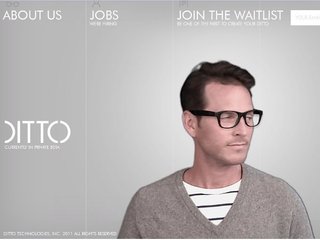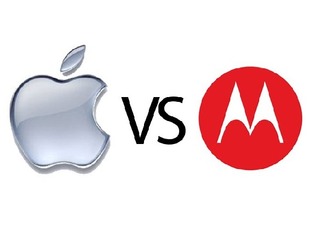
When big brands use patents to crush the competition
1-800-Contacts uses IP law to get rid of competition, and startups like Ditto are paying the price

No one likes a patent troll—an imaginary company that buys up and squats on patents until another—real—business comes along with technology that “infringes” on that patent. And then bam, the patent troll sues and bleeds the startup of cash. The harm caused by patent trolls is real and it’s felt not just by entrepreneurs and their employees, but by the larger economy as a whole. If businesses don’t innovate for fear that all their revenues will just be siphoned off by a parasitic patent troll, that results in less competition among businesses, fewer options for consumers, and less money circulating in the economy.
But what happens when the patent troll isn’t just some skeezeball Joe Schmoe, but one of the most recognizable brands in the industry? That’s more or less what Ditto—a small Silicon Valley startup—is up against. The company, which has developed virtual try-on technology for eyeglasses, is being sued by 1-800-Contacts for patent infringement.
Companies sue other companies all the time—Apple, Google, Samsung are like the three continually warring countries in George Orwell’s 1984—but the details of this case are particularly skeezy, partly due to the lopsided nature of the case (an industry giant suing a small startup), and partly because it more or less goes against the basic principles of a U.S. economy based on competition.
The case
Launched in April 2012, Ditto is a 15-person team that has developed technology that allows consumers to virtually “try on” glasses using digital video and a webcam. The technology allows you to see how you would look in different styles and frames—a problem for those of us who struggle to find the right pair of glasses for our bone structure. The startup raised $3 million in a seed round led by August Capital last spring and was gearing up to raise a Series A round this summer—until 1-800-Contacts filed a non-infringement lawsuit in February.
At the time that 1-800-Contacts filed the suit, the company had no virtual try-on technology. In fact, Ditto found that 1-800-Contacts CEO Jonathan Coon actually visited the site and made a Ditto immediately after the startup launched (pictured below). And while Ditto had filed a patent of its own—a process that can take years—1-800-Contacts took the shorter route: shortly after checking out Ditto's technology, it went out and bought an existing patent on similar technology, which it is now using to sue Ditto for patent infringement.

The patent in question is U.S. 7016824 B2, which was issued in 2001 for technology that creates a fully textured 3D face—like a Wii character—for a virtual try-on. Ditto’s platform is 2D video. Not the same. But that’s not stopping 1-800-Contacts from suing them anyway.
In an attempt to avoid costly litigation, Ditto asked if 1-800-Contacts could license the patent to them, but 1-800-Contacts had no interest in licensing.
So what’s the point of the lawsuit?
The point is to simply get rid of the competition. Being a defendant in a non-infringement suit can cost millions over the course of several years. To make matters worse, 1-800-Contacts filed the lawsuit in its home state of Utah, which means Ditto has to funnel even more money into travel costs.
Ditto CEO Kate Endress said Ditto will have to spend every last dollar on fighting a suit that it would doubtlessly win, since its technology is clearly not infringing on 1-800-Contacts' patent. The problem is that it may not be able to afford to win.
Endress said she has already spent $60,000 in the last month on legal costs.
“I should be spending that money on marketing and engineers,” she said in an interview.
Instead, Ditto is going to have to focus on breaking even. If the process of fighting the suit doesn’t shut Ditto down altogether, it will certainly stall it in crucial ways. For starters, Ditto was going to raise a Series A round this summer, but now that’s off the table.
“No one wants to invest in a startup that’s spending all of its money on a lawsuit,” said Endress. “The few conversations that we’ve had with investors have shown that they’re scared of this.”
Meanwhile, as Ditto’s business is forced to stagnate while it puts every last dollar towards fighting the suit, 1-800-Contacts gains more and more market share.
Not quite a patent troll, but pretty damn close
1-800-Contacts would not comment on the story, but the company’s lawyers did respond to the Electronic Frontier Foundation, which caught wind of the story and ran an article castigating 1-800-Contacts.
“1-800-Contacts began developing its 3D try on technology long before Ditto was founded,” the company’s lawyers argued. “1-800-Contacts invested significant time and resources to do so. They had a working version of their system long before Ditto ever launched their platform.”
So 1-800-Contacts’ lawsuit can best be summed up as: “I saw it first!” Even though the company didn’t buy the existing patent until after Ditto launched. So in effect, 1-800 is suing Ditto because it claims it had the idea first. If that’s the basis of the lawsuit, virtually every startup and major company today could be looking at hefty legal fees that could paralyze innovation as we know it.
Earlier this month, 1-800-Contacts revealed its own virtual try-on technology—an iPad app that allows users to make digitized 3D versions of their own faces. The app won’t be available until next month.
What this means is 1-800-Contacts is not a patent troll in the traditional sense of the term. The company didn’t buy a patent to sit on it and wait for some unsuspecting startup to “infringe” on it so that it could sue. Unfortunately for Ditto, this means that they would not find any protection under the proposed Shield Act, which is designed to thwart “non-practicing entities," or companies that have purchased patents that they're not using.
1-800-Contacts has the money to throw away on hollow lawsuits. The largest direct-to-consumer retailer of contact lenses in the U.S., the company raked in $414 million in revenue in 2012. And last year, the company was acquired by WellPoint for $900 million, though it remains headquartered in Draper, Utah. WellPoint—the largest for-profit managed healthcare company in the Blue Cross and Blue Shield Association—generated a net income of $885.2 million on revenue of $17.5 million in the first quarter of 2013. In 2012, WellPoint’s revenue totaled $61.7 billion.
A history of using litigation to quash the competition
1-800-Contacts has a history of suing its competitors, starting with Johnson & Johnson in 2002 because J&J—a manufacturer of contact lenses, including Acuvue—wouldn’t sell to 1-800-Contacts. The antitrust lawsuit, which was eventually settled in 1-800-Contacts’ favor, was hailed as a victory for competition and consumers’ rights.
Indeed, 1-800-Contacts has fashioned itself as something of a champion for consumers’ rights. 1-800-Contacts was a big supporter of The Fairness to Contact Lens Consumers Act, which gave consumers the right to use their contact lens prescriptions to shop where ever they wanted. 1-800-Contacts CEO Jonathan Coon claims to have personally devoted over 300 days over the course of five years to getting the act passed.
While the company claims to be a champion for the consumer, its use of patent and trademark law to quash the competition tells a different story.
In 2007, 1-800-Contacts sued Lens.com and 14 other companies for trademark infringement. The suit stemmed from the fact that competitors were bidding on variations of “1-800” for keywords on Google ads.
As it turned out, Lens.com never purchased keywords that specifically used 1-800-Contacts’ registered trademark, so there was no trademark infringement in the first place. But to cap things off, 1-800-Contacts was accusing Lens.com of doing something that it, in turn, was doing. 1-800-Contacts had purchased several keywords that were plays on Lens.com’s registered trademarks.
Lens.com is the second largest online retailer for contact lenses, behind 1-800-Contacts, and the two have been locked in litigation for years. 1-800-Contacts’ original case was decided in favor of Lens.com, but 1-800-Contacts appealed. Meanwhile, Lens.com has appealed to have 1-800-Contacts pay their legal fees.
Lens.com CEO Cary Samourkachian said that Lens.com has paid out over $2 million in legal fees to date. In 2007, Lens.com’s annual sales were slightly over $25 million.
“Obviously it hurt us and this is why 1-800 files these suits. Even if they lose the suit, they have harmed us and the consumers,” said Samourkachian.
But there’s an even more insidious side to these lawsuits, Samourkachian said. 1-800-Contacts does whatever it can to increase the costs of litigation, so smaller competitors who don’t have the kind of cash to throw around that 1-800-Contacts has are forced to settle. What this means is they ultimately sign whatever 1-800-Contacts puts in front of them.
“These one-sided settlement agreements come back to haunt them because 1-800 made them agree to stop doing things they are lawfully allowed to do. They further provide for automatic damages if the agreement is breached and it provides that all lawsuits arising from breach of the agreement have to be brought in Utah 1-800's home forum,” said Samourkachian.
There may never be a breach of terms, but the smaller company can’t effectively compete because it signed away all of its rights. Additionally, 1-800-Contacts might allege a breach, which forces the smaller company to go back to court—and if it loses, it’s forced to pay 1-800-Contacts’ legal fees.
“They do this as a business practice, and it is a means of unfair competition,” said Samourkachian, who has since filed an antitrust suit accusing 1-800-Contacts of engaging in anti-competitive practices using litigation as a weapon against smaller competitors.
Where does that leave Ditto?
Unfortunately for Ditto and other tech startups, right now, there is no law on the books to protect them from bogus lawsuits brought forth by companies looking to crush them with legal fees.
And it means that for all of 1-800-Contacts’ posturing as a freedom fighter for healthy competition in the business world, 1-800 only wants competition insofar as no one is competing with it.
Image source: onlinemba.com
Related News


Ditto raises $3M so you can try on eyewear virtually

Motorola accuses Apple of violating patents

Facebook patents social-based search

Fark slays the patent troll

